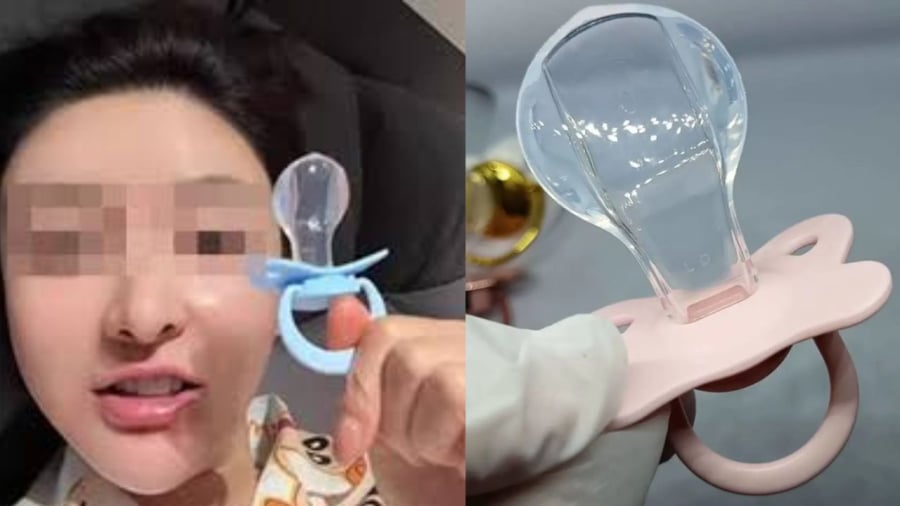
Candace Cameron Bure’s Daughter Natasha Marries Disney Channel Alum – Inside Their Wedding
A hands-on bride, a tender mother’s tribute in something blue, and music drawn from a romantic first movie night came…

In recent years, a phenomenon that has stirred up the Chinese online community and psychological experts is that many middle-aged adults choose to suck on pacifiers – a habit that seems to be reserved for infants. This action may seem strange at first glance, even surprising to others, but in fact it reflects many psychological and social aspects and the need for spiritual healing in modern life. So why are more and more adults sucking on pacifiers, and is this a sign of illness or just a way to soothe themselves?
1. “Regression” psychology – returning to childhood to find comfort
One of the top reasons adults turn to pacifiers is psychological regression. This is a natural response to feeling stressed, out of control, or under great pressure. Instead of facing the problem head-on, many people tend to revert to childhood behaviors to find security and comfort.

Pacifier sucking in this case serves as a “psychological lifeline” – a reminder of a carefree, protected, and loved childhood. This behavior is not necessarily pathological, but sometimes simply a way for an individual to cope with trauma, fatigue, or loneliness.
2. Stress and pressure of modern life
Adults often face a midlife crisis – when they begin to reassess their lives, facing concerns about work, children, health, marriage, or even the loss of a loved one. Feelings of emptiness, loss, or disorientation can lead them to seek a simple but effective form of relief.
In that context, some people find that sucking on a pacifier can be relaxing, relieving feelings of anxiety, much like how others chew gum, smoke, or scratch their heads when stressed.
3. ASMR Trend and Sensory Therapy
ASMR (Autonomous Sensory Meridian Response) – a unique sensory response that feels pleasant – is becoming a popular trend these days. Many people use sounds, images, or gentle physical contact to induce a feeling of relaxation.
Pacifiers, in some cases, also produce effects similar to ASMR. The repetitive sucking and releasing of the pacifier, combined with steady breathing, provides a sense of security and relaxation for many people. It is considered a form of “informal sensory therapy”, helping to control emotions and calm the nervous system.
4. TikTok, social media, and the “adult pacifier ”
There’s no denying that social media has helped spread the phenomenon. Search terms like “adult pacifier” and “soothing toy for adults” are getting millions of views on TikTok, Instagram, and YouTube. Many people even share videos of themselves sucking on a pacifier as part of their “healing routine” or good sleep habits.
When a behavior is widely shared online, it becomes normalized, especially among those looking for a simple, inexpensive, and drug-free form of stress relief.
5. Should I worry if my loved one is using a pacifier?
From a scientific perspective, pacifier use is not harmful if done correctly and does not interfere with daily functioning. However, if the behavior becomes compulsive, time-consuming, or interferes with social life, it may be a sign of a psychological problem that requires intensive support. Pacifier abuse can affect teeth and health if the material and hygiene are not good.
According to psychologists, it’s important to understand the motivation behind the behavior – is the person stressed? hurt? depressed? or simply enjoying and relaxing? Judging or ridiculing someone who sucks a pacifier is not only disrespectful, but can also make them more withdrawn and self-conscious.
6. Pacifiers: Healing or Addiction?
Like many other “sedative” behaviors such as eating sweets, biting nails, hugging stuffed animals, etc., pacifier use can be healthy in moderation. However, if the individual becomes dependent, unable to sleep or function normally without the pacifier, this is a warning sign that needs attention.
In that case, users should seek out healthier forms of relaxation such as meditation, yoga, journaling, psychotherapy, or building a positive social network to reduce the need to “self-soothe” with items like pacifiers.

A hands-on bride, a tender mother’s tribute in something blue, and music drawn from a romantic first movie night came…

The ultra-wealthy are investing in cryogenic freezing, preserving their bodies at ultra-low temperatures with the hope that future science will…

Elephant enters grocery store looking for food THAILAND A male elephant weighing about 4 tons broke into a grocery store in…

Cardi B is pregnant with her fourth child. Rap star Cardi B has revealed she is pregnant with her new…

Seeing again after 20 years thanks to tooth implant in eye Brent Chapman, a Canadian who was blind for more…

The most beautiful Miss World gives birth 26-year-old beauty Krystyna Pyszková – Miss World 2024 – announced that she has…

Your body has an incredible way of signaling when something might be wrong, including early warning signs of cancer. Listening…

Identifying the warning signs of brain aneurysm can be challenging, yet medical professionals are trying to raise awareness of the…

The Houston International Airport was buzzing with its usual chaos. Suitcases rolled loudly over polished floors, announcements echoed overhead, and…

My wife left me and the kids, and her decision not only brought devastation and anger but also left me…

An Australian family experienced a nightmare after their 4-year-old girl was temporarily blinded in one eye by a common household…

In recent years, a phenomenon that has stirred up the Chinese online community and psychological experts is that many middle-aged…